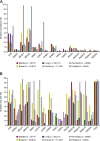Landscape of homologous recombination deficiencies in solid tumours: analyses of two independent genomic datasets
- PMID: 34979999
- PMCID: PMC8722117
- DOI: 10.1186/s12885-021-09082-y
Landscape of homologous recombination deficiencies in solid tumours: analyses of two independent genomic datasets
Abstract
Background: DNA repair deficiencies are characteristic of cancer and homologous recombination deficiency (HRD) is the most common. HRD sensitizes tumour cells to PARP inhibitors so it is important to understand the landscape of HRD across different solid tumour types.
Methods: Germline and somatic BRCA mutations in breast and ovarian cancers were evaluated using sequencing data from The Cancer Genome Atlas (TCGA) database. Secondly, a larger independent genomic dataset was analysed to validate the TCGA results and determine the frequency of germline and somatic mutations across 15 different candidate homologous recombination repair (HRR) genes, and their relationship with the genetic events of bi-allelic loss, loss of heterozygosity (LOH) and tumour mutation burden (TMB).
Results: Approximately one-third of breast and ovarian cancer BRCA mutations were somatic. These showed a similar degree of bi-allelic loss and clinical outcomes to germline mutations, identifying potentially 50% more patients that may benefit from precision treatments. HRR mutations were present in sizable proportions in all tumour types analysed and were associated with high TMB and LOH scores. We also identified numerous BRCA reversion mutations across all tumour types.
Conclusions: Our results will facilitate future research into the efficacy of precision oncology treatments, including PARP and immune checkpoint inhibitors.
Keywords: Breast; Genomic loss of heterozygosity; Germline; Homologous recombination deficiency; Homologous recombination repair; Immune checkpoint inhibitors; Loss of function; Ovarian; PARP inhibitors; Somatic; cancer.
© 2021. The Author(s).
Conflict of interest statement
ZL, MX, EAH, JCB and DH are employees of, and hold stock in AstraZeneca. MB and ES are employees of Foundation Medicine Inc., Cambridge, MA, USA. JD declares no competing interests.
Figures




References
-
- O'Connor MJ. Targeting the DNA damage response in cancer. Mol Cell. 2015;60(4):547–560. - PubMed
-
- Schweizer MT, Antonarakis ES. Prognostic and therapeutic implications of DNA repair gene mutations in advanced prostate cancer. Clin Adv Hematol Oncol. 2017;15(10):785–795. - PubMed
-
- Bryant HE, Schultz N, Thomas HD, Parker KM, Flower D, Lopez E, Kyle S, Meuth M, Curtin NJ, Helleday T. Specific killing of BRCA2-deficient tumours with inhibitors of poly(ADP-ribose) polymerase. Nature. 2005;434(7035):913–917. - PubMed
-
- Farmer H, McCabe N, Lord CJ, Tutt AN, Johnson DA, Richardson TB, Santarosa M, Dillon KJ, Hickson I, Knights C, et al. Targeting the DNA repair defect in BRCA mutant cells as a therapeutic strategy. Nature. 2005;434(7035):917–921. - PubMed
-
- Dougherty BA, Lai Z, Hodgson DR, Orr MCM, Hawryluk M, Sun J, Yelensky R, Spencer SK, Robertson JD, Ho TW, et al. Biological and clinical evidence for somatic mutations in BRCA1 and BRCA2 as predictive markers for olaparib response in high-grade serous ovarian cancers in the maintenance setting. Oncotarget. 2017;8(27):43653–43661. - PMC - PubMed
MeSH terms
Substances
LinkOut - more resources
Full Text Sources
Medical
Miscellaneous

